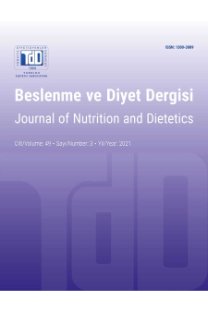Hedonik Açlık ve Yeme Davranışı İlişkisinin Farklı Beden Kütlelerine Yansıması
Reflection of the Relationship Between Hedonic Hunger and Eating Behavior on Different Body Masses
___
- 1. Simpson KA, Bloom SR. Appetite and hedonism: Gut hormones and the brain. Endocrinol Metab Clin North Am. 2010;39(4):729-14.
- 2. Sumithran P, Prendergast LA, Delbridge E, Purcell K, Shulkes A, Kriketos A, et al. Long-term persistence of hormonal adaptations to weight loss. N Engl J Med. 2011;365(17):1597-7.
- 3. Berthoud HR. Metabolic and hedonic drives in the neural control of appetite: Who is the boss?. Curr Opin Neurobiol. 2011;21(6):888-8.
- 4. Lowe MR, Butryn ML, Didie ER, Annunziato RA, Thomas JG, Crerand CE, et al. The Power of Food Scale. A new measure of the psychological influence of the food environment. Appetite. 2009;53(1):114-8.
- 5. Ulker I, F, Yildiran H. Validation of the Turkish version of the Power of Food Scale in adult population. Eat Weight Disord. 2020;26(4): 1179-1186.
- 6. Cappelleri JC, Bushmakin AG, Gerber RA, Leidy NK, Sexton CC, Karlsson J, et al. Evaluating the Power of Food Scale in obese subjects and a general sample of individuals: Development and measurement properties. Int J Obesity. 2009;33(8):913-9.
- 7. Chmurzynska A, Mlodzik-Czyzewska MA, Radziejewska A, Wiebe DJ. Hedonic hunger is associated with intake of certain high-fat food types and BMI in 20-to 40-year-old adults. Nutr J. 2021;151(4):820-5.
- 8. Aliasghari F, Yaghin NL, Mahdavi R. Relationship between hedonic hunger and serum levels of insulin, leptin and BDNF in the Iranian population. Physiol Behav. 2019;199:84-7.
- 9. Ely AV, Howard J, Lowe MR. Delayed discounting and hedonic hunger in the prediction of lab-based eating behavior. Eat Behav. 2015;19:72-5.
- 10. Gündüz N, Aakhilal M, Sevgi EN. Hedonik açlık. Izmir Democracy University Health Sciences Journal.2020;3(1):80-16.
- 11. Treasure J, Duarte TA, Schmidt U. Eating disorders. Lancet. 2020;395(10227):899-12.
- 12. Mason TB, Pacanowski CR, Lavender JM, Crosby RD, Wonderlich SA, Engel SG, et al. Evaluating the ecological validity of the Dutch Eating Behavior Questionnaire among obese adults using ecological momentary assessment. Assessment. 2019;26(5):907-7.
- 13. Berridge KC. ‘Liking’ and ‘wanting’ food rewards: Brain substrates and roles in eating disorders. Physiol Behav. 2009;97(5):537-13.
- 14. Pi-Sunyer, FX. Obesity: criteria and classification. Proceedings of the Nutrition Societ. 2000;59(4): 505-509.
- 15. Bozan N, Bas M, Asci FH. Psychometric properties of Turkish version of Dutch Eating Behaviour Questionnaire (DEBQ). A preliminary results. Appetite. 2011;56(3):564-6.
- 16. Schultes B, Ernst B, Wilms B, Thurnheer M, Hallschmid M. Hedonic hunger is increased in severely obese patients and is reduced after gastric bypass surgery. Am J Clin.Nutr. 2010;92(2):277-6.
- 17. Thomas EA, Bechtell JL, Vestal BE, Johnson SL, Bessesen DH, Tregellas JR, et al. Eating-related behaviors and appetite during energy imbalance in obese-prone and obese-resistant individuals. Appetite. 2013;65:96-6.
- 18. Ribeiro G, Camacho M, Santos O, Pontes C, Torres S, Oliveira-Maia AJ. Association between hedonic hunger and body-mass index versus obesity status. Scientific Reports. 2018;8(1):1-9.
- 19. Silventoinen K, Konttinen H. Obesity and eating behavior from the perspective of twin and genetic research. Neurosci Biobehav Rev. 2020;109:150-15.
- 20. Zhao AW, McGowan CC, Zenk SN, Kershaw KN. Associations of the consumer food environment with eating behaviors and Body Mass Index. Public Health Nutr. 2020;23(17):3197.
- 21. Snoek HM, Van Strien T, Janssens JM, Engels RC. Emotional, external, restrained eating and overweight in Dutch adolescents. Scand J Psychol. 2007;48(1):23-9.
- 22. Sanlier N, Biyikli AE, Biyikli ET. Evaluating the relationship of eating behaviors of university students with body mass index and self-esteem. Ecol Food Nutr. 2015;54(2):175-10.
- 23. Lluch A, Herbeth B, Mejean L, Siest G. Dietary intakes, eating style and overweight in the Stanislas Family Study. Int J Obes. 2000;24(11):1493-9.
- 24. Lowe MR, Arigo D, Butryn ML, Gilbert JR, Sarwer D, Stice E. Hedonic hunger prospectively predicts onset and maintenance of loss of control eating among college women. Health Psychol. 2016;35(3):238.
- 25. Manasse SM, Espel HM, Forman EM, Ruocco AC, Juarascio AS, Butryn ML, et al. The independent and interacting effects of hedonic hunger and executive function on binge eating. Appetite. 2015;89:16-5.
- 26. Witt AA, Lowe MR. Hedonic hunger and binge eating among women with eating disorders. Int J Eat Disord. 2014;47(3):273-7.
- ISSN: 1300-3089
- Yayın Aralığı: Yılda 3 Sayı
- Başlangıç: 1972
- Yayıncı: Türkiye Diyestisyenler Derneği
Ağırlık Yönetiminde Omega-3 Çoklu Doymamış Yağ Asitlerinin Rolü
Ramazan Mert ATAN, Nihal Zekiye ERDEM
Yasemin DURDURAN, Ayşe SAĞDIÇ, Lütfi Saltuk DEMİR, Mehmet UYAR, Mehtap YÜCEL
Diyet Enerji Yoğunluğunun Diyet Kalitesi ve Antropometrik Ölçümler ile İlişkisi
Meltem Pınar YILDIRIM, Burcu ATEŞ ÖZCAN
Sağlık Okuryazarlığının Diyet Kalitesine Etkisi
Yağmur Yaşar FIRAT, Müge YILMAZ, Fatma Hazan GÜL, Tutku ATUK KAHRAMAN
Serebral Palsi’li Çocuklarda Çiğneme Bozuklukları ve İlişkili Beslenme Problemleri
Fatih ÖZDER, SELEN SEREL ARSLAN
Hedonik Açlık ve Yeme Davranışı İlişkisinin Farklı Beden Kütlelerine Yansıması
Feride AYYILDIZ, İzzet ÜLKER, Hilal YILDIRAN
Bahar GÜÇİZ DOĞAN, Duygu Ayhan Başer, Mustafa Cankurtaran
Serebral Palsi’li Çocuklarda Çiğneme Bozukluğunun Klinik ve Nütrisyonel Değerlendirmesi: Olgu Sunumu
Fatih ÖZDER, Fatma ILGAZ, SELEN SEREL ARSLAN
Diyetle Şeker Alımı: Tolere Edidebilir Üst Alım Miktarı
Oral Kontraseptif Kullanımının Sağlık ve Serum Mikro Besin Ögesi Seviyeleri Üzerine Etkisi
